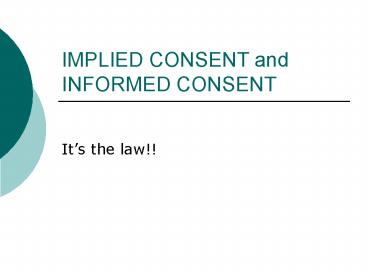IMPLIED CONSENT and INFORMED CONSENT - PowerPoint PPT Presentation
1 / 18
Title:
IMPLIED CONSENT and INFORMED CONSENT
Description:
During the first visit (or first visit of a new complaint or condition), the ... The doctor must take a case history and must perform necessary examinations ... – PowerPoint PPT presentation
Number of Views:327
Avg rating:3.0/5.0
Title: IMPLIED CONSENT and INFORMED CONSENT
1
IMPLIED CONSENT andINFORMED CONSENT
- Its the law!!
2
What is Implied Consent?
- During the first visit (or first visit of a new
complaint or condition), the doctor must gather
information about that patient - The doctor must take a case history and must
perform necessary examinations - By the patients presence in the office, consent
for the EXAMINATIONS is IMPLIED
3
IMPLIED CONSENT
- Therefore, by the patients presence in your
office, you do not need to obtain written
permission to perform necessary examinations - Verbal consent to perform exam is all that is
needed for most situations (in DC offices)
4
IMPLIED CONSENT
- He or she is automatically giving you permission
for information-gathering only - The patient has NOT given the doctor permission
to perform any interventions/treatments/therapies
(i.e. an adjustment) - Obviously, exceptions apply when the situation is
critical (ER, EMT)
5
Questions about IMPLIED CONSENT?
6
INFORMED CONSENT
- It is both a process and paperwork
- Informed consent begins after the doctor has
gathered all necessary information and has
determined the necessary intervention
7
INFORMED CONSENT
- The doctor must give the information he or she
knows that may play a role in the patients
decision about his or her health or health care
choices
8
INFORMED CONSENT
- There are 5 important elements of the informed
consent process - 1. Diagnosis/Clinical Impression
- Patient wants to know
- What is wrong with me?
- This must be given in understandable terms
9
INFORMED CONSENT
- 2. Treatment/Intervention
- The patient wants to know
- Can you help me?
- This is NOT the time to explain the exact
technique of adjusting or biomechanics of
adjusting. One explains how chiropractic can
help with the particular diagnosis from element
1
10
INFORMED CONSENT
- 3. Risks or complications associated with the
treatment or with the diagnosis - In some states, you are required to explain in
writing - For example, you must give lifting restrictions
to a patient with an acute disc herniation
11
INFORMED CONSENT
- 4. Alternative treatments, concurrent treatments,
or additional diagnostic procedures - This is the time to tell the patient if more
treatments or tests are needed (either within or
outside of your office)
12
INFORMED CONSENT
- 5. Successes and Failures
- The patient wants to know
- What is my prognosis?
- This information is based upon personal
experiences of the doctor, literature, research,
classroom knowledge
13
INFORMED CONSENT
- So, by informing the patient of the 5 elements,
you have completed the process of INFORMED
CONSENT - By having the patient sign the form, you have
completed the paperwork part of INFORMED CONSENT - Remember, though, that if the patients condition
or complaints change, or you must change your
clinical impression, you must repeat INFORMED
CONSENT
14
IS THIS FOR PALMER ONLY?
- You must utilize an informed consent process for
every patient in your office - What if you do not inform a patient prior to an
adjustment (or any form of treatment)?
15
What about minors?
- In Iowa and Illinois, care of any patient under
the age of 18 requires the consent of a parent or
a legal guardian - The parent or legal guardian is required to be
present on the first visit
16
TWO RULES
- Additionally, there are two rules associated with
informed consent that you should be aware of - The Doctors Rule
- The Patients Rule
17
The Doctors Rule
- In ALL states, the Doctors Rule applies
- The doctor determines what information is
important to deliver to the patient. - Example Kidney stone
18
The Patients Rule
- In SOME states, the Patients Rule applies
- The doctor must give any and all information to
the patient in order for him or her to make an
informed decision about his or her health care
options - Example Kidney stone
- It is not a rule that the patient must tell the
doctor everything about the complaint































